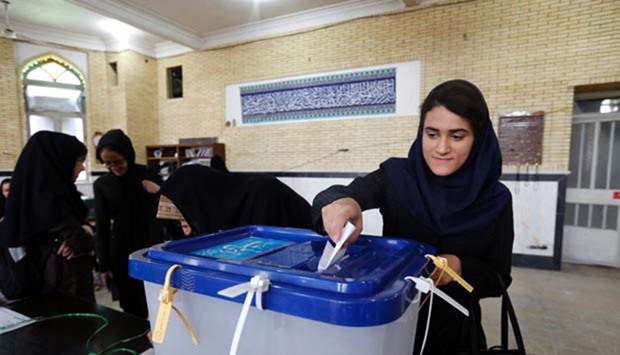With 68 of 290 seats in parliament at stake the vote will decide who has the most power when lawmakers are sworn in next month, opening or closing a path to limited social and political change in the Islamic republic.
The reformists - who want Iran to open up to foreign investment, support moves for greater diplomatic rapprochement and seek social reforms at home - are allied with President Hassan Rouhani's government and they made big gains in the first round.
The first round of voting in February came six weeks after Tehran's implementation of a nuclear deal with world powers lifted crippling economic sanctions long blamed for hobbling the economy.
Polling stations opened at 8:00 am on Friday for the ballot which is taking place in 21 provinces, but not the capital Tehran.
Around 17mn citizens can vote as no candidate in the 68 constituencies up for grabs won the minimum 25% required in the first round.
Voting ends in the evening and results are expected on Sunday.
"We need good relations with the world to have a better economy. The government needs support," Hamid Reza Aghayi, a 33-year-old salesman, told AFP in Robat Karim, a city southwest of Tehran, after voting for a reformist candidate.
Conservatives, including vocal opponents of the nuclear agreement which reined in Iran's atomic programme, lost dozens of MPs in the first round, suffering a wipeout in Tehran, where reformists took all 30 seats.
However Friday's voting - in which a seat's top two candidates from the first round compete head to head - covers 55 smaller towns and cities where conservative support held up.
"We should protect the country from the arrogant powers and their infiltration," said Zahra Karimdoost, a school teacher in Robat Karim who voted conservative, referring to the US.
Rivals seek a majority
"They follow the leadership more seriously," she said of the conservatives, alluding to supreme leader Ayatollah Ali Khamenei and other clerics at the top of Iran's establishment.
Nationally, reformists won 95 seats and the conservatives 103 in February with nominally independent candidates and minorities sharing others, meaning no faction won a majority.
The outcome of the second round could change that.
Khamenei urged strong turnout and has said Friday's voting is no less important than the first round.
Mohammad Reza Aref, leader of the reformist pro-Rouhani List of Hope, has set a target of at least another 40 seats in parliament.
Gains for the president's allies would make legislative reforms more likely.
However if conservatives perform more strongly amid concern over the nuclear deal - Iranian officials including Khamenei have complained that the US is not honouring its commitments - Rouhani's hopes for a more supportive parliament could founder.
Although the conservatives went backwards two months ago they have not changed tack, keeping up pressure over what they say is a silent agenda among reformists to give up the principles of the 1979 Islamic revolution.
"We hope that people in this round can have a parliament in line with the goals of Imam and the leadership by electing principlists," said Gholam-Ali Hadad Adel, head of the conservative coalition.
He was referring to revolutionary leader Ayatollah Ruhollah Khomeini and his successor Khamenei, Iran's ultimate authority with powers that far outweigh Rouhani, who was voted into office in a landslide in 2013.

